My Games of 2013
Playing games is probably my third most common activity, right after going to work and sleeping. I play a shitload of them, and wish I had time to play more. I also write an awful lot about games in various places, many of which fairly ephemeral in nature and not easily discoverable by other people in any event, so for a while I’ve been thinking about collecting some of my ramblings somewhere.
So, I decided that I would kick off this site, the 500th attempt at a place where I write things, with a post about what I loved from 2013. Here’s a bunch of those games. It is in no particular order, and is what I was playing in 2013, not necessarily what actually came out in 2013. You can pretend it’s a Game of the Year list, though, I won’t mind.
Persona 4 Arena
I have a deep love-hate relationship with fighting games. Mostly on the love side, but every time I get into one, I eventually get frustrated with my lack of professional-level skills in the game and let it drop. After I played Persona 4 Golden extensively (spoiler alert: more on that at the bottom), my mom got me Persona 4 Arena and I went in pretty hard on that in 2013. As would be expected of an ArcSys x Atlus collaboration, it combines real fighting game chops with a Persona story.
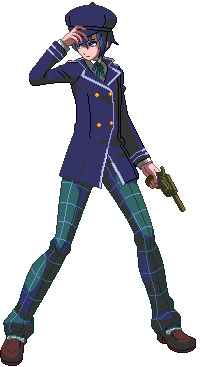
On paper, there’s not much interesting to say about the game on a general level. P4A is a more accessible BlazBlue, a very solid “anime” fighter, with some decent to good story mode stuff by the Atlus side. Much of the Persona 4 warm fuzzies live on in P4A, and it’s pretty goddamn fun to play fighting games using the investigation team.
What makes the game noteworthy for me is that it is the first fighting game I took to online ranked matches for and kept with it. After a lot of practice I decided to main Naoto; I hit the wikis and studied her normals and specials, I crawled up the ladder, made it to what I’d classify as “not totally shitty”, frauded my way to B+ for a while, and then let the game slip and now I only play it here and there. But I still love it. I bought a stick to attend a couple tourneys (but I chickened out), I ignited in near rage after a couple stupid drops online, I let adrenaline rushes of a near win send me into a trembling, jittery mess, I burned out the A on my stick to the point that I had to get replacement buttons, and then I used that as an excuse to get some different-colored buttons to jazz up my stick a bit.
It’s just, fuck, I love fighting games. They’re the best. And one that pulls at my love for Persona 4 is the goddamned double best.
I don’t know if I’ll ever go to a tournament to play, but I still play online with the gang, and we have great serious sparring events. Even if I’m never tournament-viable, I have a hell of a time pretending I’m at that level, and it’s great.
Zero Escape: Nine Hours, Nine Persons, Nine Doors
After sleeping on the game for years, I finally bothered trying 999 and fell in love with it. It combines visual novels, room escape games, and X-Files-level fringe science and myth into one wonderful little game about murder. The core game, itself presented as the Nonary Game, is interesting enough — you’re trapped in a game with other mysterious characters, and to survive you have to solve logic-n’-such puzzles to progress through the game. This was all pretty cool, but what really did it was the game’s final chapter, where, without spoiling anything, all the shit hits the fan and the game’s metaplot unravels.
On paper it would have just been an interesting game, but two elements put 999 on this list: the fringe science topics sprinkled throughout the narrative of the game that made for great Wikipedia fodder, and the game’s striking final sequence in the true ending. I won’t spoil a thing about the ending, but it uses the DS in an extremely interesting way, and the imagery and background music send fond chills down my spine to this day.
Additionally, the game tiptoes the line of gore while mostly avoiding showing any actual gore, instead relying on vivid language to describe the horrible ways people have died in the game, and that’s pretty cool.
Zero Escape: Virtue’s Last Reward
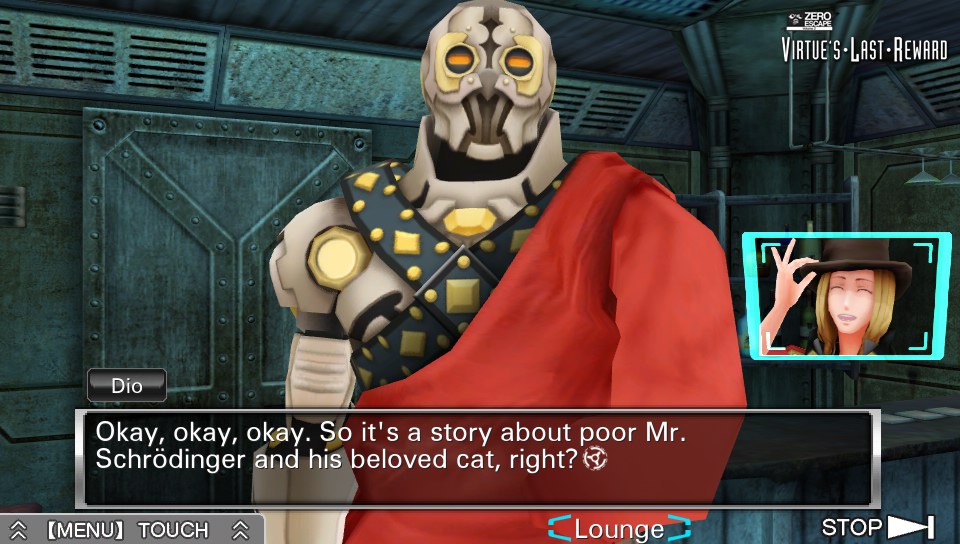
Much of what I just said about 999 can apply to VLR. The narrative from the first game is stronger, enhanced, and made even more insane. Many of the concepts of the first game are refined in the second. Despite being, in part, a set up for the third game of the trilogy, Virtue’s Last Reward still tells a number of compelling stories through its characters. The story is less directly dark than the murder-game-focused 999, but there’s still plenty of “whoa, that [REDACTED] is fucking terrifying”, or “[REDACTED]’s story is so sad”. And, of course, it features even more room escape puzzles.
A particularly nice element in VLR, over 999, was that the pseudo-science stuff in the first game, as cool as it is, was replaced by more hard science and philosophy. To call out some of them would be borderline spoilers just by their nature, but suffice it to say that, as you can see to the right, topics like Schrödinger’s cat are played with in the story.
In the end, 999 and VLR are both great companions to each other. Both are strong games with great stories, and they each have a pretty bumping, yet pensive at times, soundtrack. Both are lovely games, and it’s fun just letting the mind wander over the theories and meta-plot of the series so far. I cannot wait for the third game.
Hatsune Miku: Project Diva f
I am not the least bit ashamed to admit that I love the Project Diva games, very Japanese rhythm games based on Vocaloids, synthesized (and for the games and media, personified) singing voice software. The headlining Vocaloid Hatsune Miku is a legitimate pop idol in Japan despite being a virtual character, and that’s just so crazy, it’s great. There are some elements to this game that can be safely ignored, such as basically all of the weird hanging out simulator Diva Room, but at the core it’s rhythm game heaven.
What I really love about the games, though, is that they are so goddamn saccharine. It’s impossible to be sad or angry while playing the games. Even the sadder, moodier songs are still so much fun that they are a perfect cure for any malaise.
I imported Project Diva f from Japan for Vita when it came out, got the PS3 game from my mom, and am likely going to again import the sequel from Japan when it comes out for Vita in a couple months.
The Walking Dead
The emotional impact of leading Lee and Clementine through a game that, frankly, is simplistic even by adventure game standards makes up for any criticism I could have of the game. Through five episodes and a set of bonus mini-episodes, Season One of Telltale’s latest opus led me into such a pensive funk that I spent an evening contemplating the message behind its themes. And god damn, that ending, I get weepy every time.
Putting aside arguing about what makes a “real” game, The Walking Dead is an exemplary example of the West doing storytelling with a video game. Character driven story, with just enough decision points and gameplay hints that made my actions gnaw at my conscience. So nice I played through it twice.
Divekick
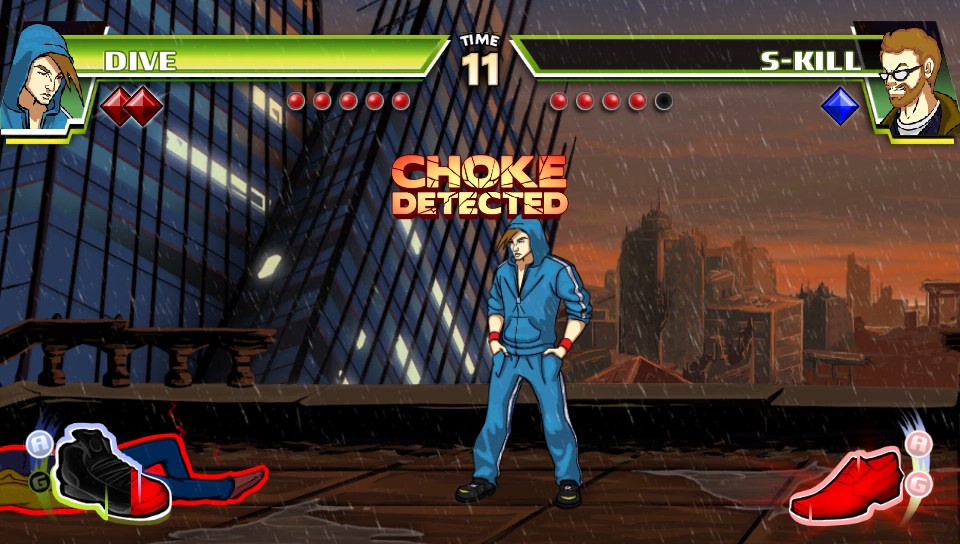
You dive and you kick. If you get kicked, you lose. Every round of Divekick is the last few seconds of those tense Street Fighter matches where both sides are at no health and both players know that one wrong move, one smart read, one incorrectly timed jump or bad position will be the difference between victory and defeat. The depth of the game is not in knowing combos, but being able to assess opponents and react accordingly, because if you don’t, you will lose.
Divekick delivers one experience — quick, intense matches where you can feel the stress building with each committed action. This is the neatest part of the game, not what it offers, but what is left after it takes so much away from standard fighting games. Once you know your character, your entire strategy is to use your tools against your opponent. When you lose, you can point to your one misread or ill-advised action that hung you. When you get trounced by an opponent, it’s not because they knew better combos, but because they knew your play better than you did.
The game’s accessibility and distilling of fighting game fundamentals are clever enough to excuse the simplistic graphics, but even the simple sprites and basic animations speak well to Divekick’s nature — it moves fast and offers few distractions from getting down to the business of frauding real life opponents. The story mode is barebones and the real game is playing against real people locally or online, but that’s where it shines — it’s great for getting a bunch of friends together over some drinks and having fun fighting each other.
Divekick is hype.
Honorable Mentions
The following games are all those that I enjoyed, but didn’t get to finish, or just quite didn’t make the cut of what I think of when I think of my games for the year, or whatever. They deserve to be called out, though, so…
- Papers, Please — the game perfectly captures an atmosphere of totalitarianism and being a mere cog in an oppressive bureaucracy, and is fun, even as it gets kind of soul-crushing to play.
- Dragon’s Crown — a great marriage of beat ‘em up gameplay, fighting game-esque mechanics, RPG progression, and a striking, beautiful art style.
- Tearaway — I loved the hell out of this game, I just didn’t have much to say. It is gorgeous, has some great … acid folk? music, and delights in making the player feel like part of the game. The papercraft is as fun as being prodded into making stupid faces as you see yourself in the sun.
- Velocity Ultra — a great little top-down shooter, it combines shooter sensibilities with some very tight execution challenges.
- Resogun — the best evolution of Defender you are likely to ever play, this has been my favorite game on PS4 so far, and it looks fucking amazing.
- Corpse Party: Book of Shadows — pretty cool horror visual novel, they turned the gore and VN elements up compared to the first game and there’s some really unsettling shit in it. Hopefully we get the next game for Vita.
And finally, my favorite game of the year…
Persona 4 Golden
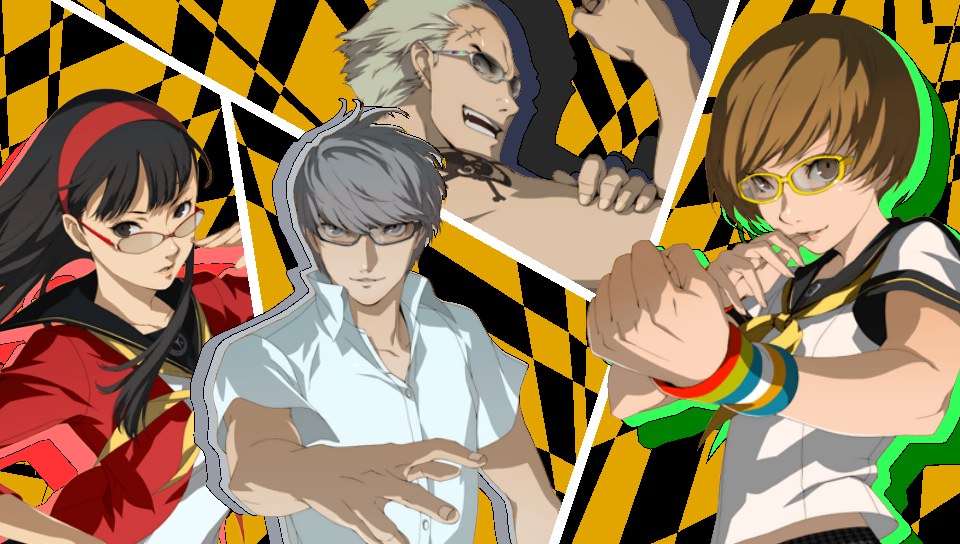
Persona 4 Golden, jesus christ I love this game.
There are games that resonate with you so completely that they are unthinkably replayable, that no matter where the industry goes in current-gen or next-gen or next-next-gen you will always cherish the memory of and think “yeah, I could sit down and play that again,” and for me Persona 4 Golden is that game. I have over 400 hours on record with the game and am still trying to find time in my schedule for yet another playthrough. My first completion of P4G was in 2012, technically, but the majority of those 400 hours are 2013 hours, so here you go.
It’s one of the few games that upon thoroughly consuming has managed to change my philosophy and outlook on the world in some way. The game presents so earnestly its motif of personal truth in the second half of the game, one I took and apply to my everyday existence, and that is something which rarely happens to me from a video game (or any form of media). Add on to that the touching themes of friendship and determination, both submitted without sarcasm or cynicism, and even after multiple playthroughs I get wistful thinking of helping these teenagers through their teenage stuff, going to school with them and hanging out with them, all while saving the world (or at least Inaba, in all its comfortingly familiar small town glory). “Reaching out to the truth” is a beautiful theme for a story, and ultimately, everything in P4G assembles in order to be a story to you, the player, an informative tale on how to conduct your life, amidst its commentary on human nature and themes of truth vs. willful ignorance.
P4G’s narrative does so much so well. To facilitate the sense that it is truly “you” in the story, it keeps the protagonist silent except for your responses and some response cues. The primary characters, both allies and enemies, are exceptionally well written, and much of that is due to each of them having realistic faults on display. The high school characters are pitch perfect, and even the final bosses succeed in honest dialogue as they present and explore the game’s philosophy rather than chewing the scenery as is common in so many games.
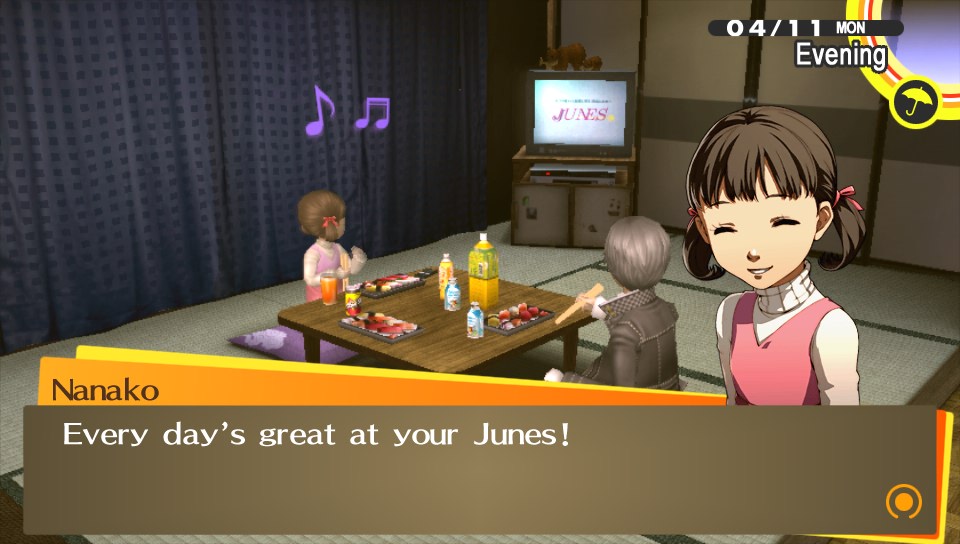
The rest of the game is no slouch, either. I’ve come to appreciate that the SMT/Persona games are what I always wanted Pokemon to be — monster collecting with evolution mechanics and customization options, but also with the ability to undo what you have created without huge penalty. P4G’s compendium makes playing with fusion a comfortable endeavor, avoiding punishing the player as they work on their perfect stable of shadow-killers. The game rewards clever play and intelligent planning over grinding, being perfectly happy to let you break the game over your knee if you figure out the nuance of its systems. And then it still throws some Atlus-hard bosses at you, because it can.
In a way, the entirety of the gameplay embraces the search for truth — the day-to-day slice-of-life side of the game is filled with activities, people to hang out with, and things to see that you might have missed at first. Minor NPCs tell their minor stories over the better part of a year, if you care to listen to them, and at any time you can stop and feed a stray cat or grab a soda from a vending machine before hanging out with the gang for the afternoon. (It suddenly dawned on me that this was a very fun aspect of Shenmue, which I also kind of miss in a way, so it is a sudden realization, but to no surprise, why I loved the minor pleasures of hanging around in Inaba.)
I could write about Persona 4 Golden forever, so I should probably stop here and save more for another longer article. If I had to pick a GOTY for 2013 it’d be this. It has changed me in ways I never imagined. I smile differently with friends, I observe the world with a more individual perspective, because of this game. Persona 4 Golden is beautiful, gorgeous, and a game I will love forever.
There you have it, a lot of the games I played in 2013. I’ll try to keep up with this in 2014. I have a huge backlog and I’m currently playing through Ys: Memories of Celceta and Sorcery Saga: Curse of the Great Curry God, so expect to see those coming up.
This article was originally posted to my site on 2014-01-11 and was my first post on that site, over seven years old from when I ported it to this current site.